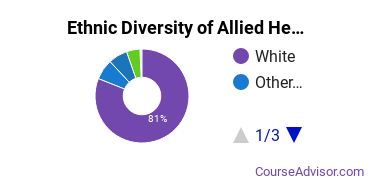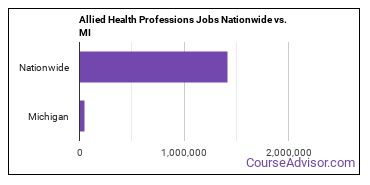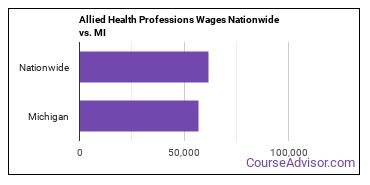Allied Health Schools in Michigan
2,056 Allied Health students earned their degrees in the state in 2022-2023.
An Allied Health major is the 17th most popular major in this state.
Featured Allied Health Professions Programs
Learn about start dates, transferring credits, availability of financial aid, and more by contacting the universities below.
Take your associate degree in an allied health field to the next level with this specialized transfer friendly online bachelor of science from Southern New Hampshire University.
Featured Allied Health Professions Programs
Learn about start dates, transferring credits, availability of financial aid, and more by contacting the universities below.
Take your associate degree in an allied health field to the next level with this specialized transfer friendly online bachelor of science from Southern New Hampshire University.
Education Levels of Allied Health Majors in Michigan
Allied Health majors in the state tend to have the following degree levels:
| Education Level | Number of Grads |
|---|---|
| Associate Degree | 840 |
| Master’s Degree | 414 |
| Award Taking Less Than 1 Year | 322 |
| Bachelor’s Degree | 280 |
| Award Taking 1 to 2 Years | 200 |
| Award Taking 2 to 4 Years | 200 |
Gender Distribution
In Michigan, a allied health major is more popular with women than with men.

Racial Distribution
The racial distribution of allied health majors in Michigan is as follows:
- Asian: 2.8%
- Black or African American: 4.9%
- Hispanic or Latino: 5.0%
- White: 76.0%
- Non-Resident Alien: 1.0%
- Other Races: 10.3%

Jobs for Allied Health Grads in Michigan
45,200 people in the state and 1,414,230 in the nation are employed in jobs related to allied health.

Wages for Allied Health Jobs in Michigan
In this state, allied health grads earn an average of $57,040. Nationwide, they make an average of $61,540.

Most Popular Allied Health Programs in MI
There are 10 colleges in Michigan that offer allied health degrees. Learn about the most popular 10 below:
Students who attend this public school pay an average net price of $15,545. 66% of the teachers are full time. 95% of students get financical aid.
Request InformationStudents enjoy a student to faculty ratio of 8 to 1. 16% of the teachers are full time. It takes the average student 4.70 years to graduate.
Request InformationOf all the teachers who work at the school, 100% are considered full time. Seeking financial aid? At this school, 100% of students receive it. 12 to 1 is the student to faculty ratio.
Request InformationSeeking financial aid? At this school, 97% of students receive it. This public school has an average net price of $12,812. 72% of the teachers are full time.
Request InformationA typical student attending Jackson College will pay a net price of $12,176. Seeking financial aid? At this school, 100% of students receive it. Of all the teachers who work at the school, 100% are considered full time.
Request InformationThis public college charges it's students an average net price of $5,402. The full-time teacher rate is 28%. Students enjoy a student to faculty ratio of 23 to 1.
Request InformationThe average student takes 4.73 years to complete their degree at Wayne State. Of all the teachers who work at the school, 58% are considered full time. 98% of students are awarded financial aid at this school.
Request Information94% of students get financical aid. This public college charges it's students an average net price of $19,884. The full-time teacher rate is 64%.
Request InformationSeeking financial aid? At this school, 99% of students receive it. This public college charges it's students an average net price of $14,630. 76% of the teachers are full time.
Request InformationOf all the teachers who work at the school, 21% are considered full time. 12 to 1 is the student to faculty ratio. Seeking financial aid? At this school, 100% of students receive it.
Request InformationAllied Health Careers in MI
Some of the careers allied health majors go into include:
| Job Title | MI Job Growth | MI Median Salary |
|---|---|---|
| Athletic Trainers | 20% | $49,310 |
| Cardiovascular Technologists and Technicians | 9% | $56,960 |
Related Majors in Michigan
Below are some popular majors in the state that are similar to allied health.
| Major | Annual Graduates in MI |
|---|---|
| Nursing | 7,345 |
| Medicine | 1,198 |
| Health/Medical Admin Services | 1,103 |
| Rehabilitation Professions | 1,067 |
| Public Health | 992 |
| Other Health Professions | 836 |
| Mental & Social Health Services | 605 |
| Allied Health Services | 522 |
View all majors related to Allied Health
Explore Major by State
Alabama
Arkansas
Connecticut
Florida
Idaho
Iowa
Louisiana
Massachusetts
Mississippi
Nebraska
New Jersey
North Carolina
Oklahoma
Rhode Island
Tennessee
Vermont
West Virginia
View Nationwide Allied Health Report
References
More about our data sources and methodologies.









